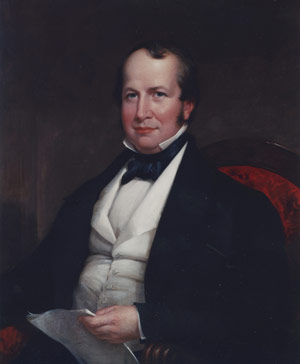Governor William Bigler
Term
January 20, 1852 - January 16, 1855
Affiliation
Democrat
Born
January 11, 1814
Died
August 9, 1880

Photo courtesy of Capitol Preservation
Committee and John Rudy Photography
Biography
William Bigler, barefoot and fatherless at age thirteen, overcame hardships in the backwoods of Pennsylvania. Bigler was born of German descent on January 1, 1814 (some references state December 31, 1813), one mile west of Dromgold at the Gibson Mill, Sherman Valley, Cumberland County (now in Spring Township, Perry County). Bigler's mother was the former Susan Dock from a well-known Harrisburg family. His father, Jacob Bigler, moved the family to Mercer County, but a defective land title destroyed the family's wealth. The elder Bigler soon fell ill and died in 1827. As a result, educational opportunities were limited. William Bigler's primary education was under the mentoring of his older brother John, publisher of the Centre County Democrat. John Bigler later became the third governor of California at the same time his brother William was governor of Pennsylvania.
In 1833, Bigler moved to Clearfield and founded a political newspaper, the Clearfield Democrat. In 1836, he married Maria Jane Reed (1816-1889), daughter of lumber merchant Alexander Reed. Bigler sold his interests in the newspaper and, between 1845 and 1850, in partnership with his father-in-law, became the largest producer of square timber on the west branch of the Susquehanna River. Bigler earned the nickname "the Clearfield Raftsman" because he personally rode lumber rafts on the Susquehanna as far south as Harrisburg, but the lumber business made Bigler very wealthy.
During this same time, the public became more impressed with his political views and sent him to the state senate from 1841 to 1847. He stressed railroad expansion in the western counties and was twice elected by colleagues as speaker of the senate. In 1849, while he was serving as Pennsylvania's revenue commissioner, the Democrats nominated Bigler for governor. The incumbent Whig governor, William F. Johnston lost popularity due to the Christiana riots in Lancaster County triggered by the federal Fugitive Slave Act of 1850 that directed states to assist in the detention and return of runaway slaves. Although Bigler opposed slavery and did not speak against those who criticized slavery, he insisted that enforcing federal law was an obligation under the U.S. Constitution. In defeating Johnston in 1851, Bigler became the youngest governor since 1790. He continued the emphasis of previous governors on government thrift, but he also became the first to criticize the State Works system and to propose, though unsuccessfully, that the state sell it off. He vetoed many special interest railroad and bank charter bills, and he convinced the General Assembly to halt its practice of logrolling—the passing of omnibus statutes in which incongruous amendments to bills favoring friends and political cronies went unchallenged.
Political parties and support for Bigler changed dramatically in 1854. The public reacted negatively to the governor's support of the federal Kansas-Nebraska Act. While the act created new states west of Missouri and Iowa, it also repealed the section of the Missouri Compromise that prohibited slavery in the new territories. The Whigs, "Know Nothing" Native American party, and anti-slavery Democrats joined forces to form the Republican Party in July 1854. The new party coalition gained the support of Nativists and temperance people and put forth gubernatorial candidate James Pollock to defeat Bigler's bid for a second term.
After leaving office, Bigler served as president of the Philadelphia and Erie Railroad until he was elected to serve in the United States Senate from 1856 to 1861. Like President Buchanan, Bigler became concerned about the growing threats of military confrontation with southern states. He visited strife-torn Kansas in 1857, encouraging opponents of slavery to vote in favor of the LeCompton Constitution despite its pro-slavery wording. Before leaving the Senate, while secession fever was rising, Bigler worked hard for the compromise proposed by pro-Union Kentucky Senator John J. Crittenden as a last ditch effort to appease the South. Both the LeCompton Constitution and the Crittenden compromise were defeated.
Bigler later served as a Democratic elder statesman by being a delegate to several Democratic National Conventions, a Union National Convention, and the state constitutional convention of 1873. As a member of the 1876 Centennial Commission, he helped convince Congress to fund the Centennial held in Philadelphia as an international exhibition rather than just a national event. That same year Bigler helped witness a vote recount in which Samuel J. Tilden, for whom he campaigned, won the popular vote, but lost the presidency to Rutherford B. Hayes by just one electoral vote. Bigler died August 9, 1880, in Clearfield, Pennsylvania, and is buried in that city's historic Hillcrest Cemetery, a cemetery marked with a state historical marker by the Pennsylvania Historical and Museum Commission.
Pages in this Section
- 1790-1876
- Thomas Mifflin
- Thomas McKean
- Simon Snyder
- William Findlay
- Joseph Hiester
- John Andrew Shulze
- George Wolf
- Joseph Ritner
- David Rittenhouse Porter
- Francis Rawn Shunk
- William Freame Johnston
- William Bigler
- James Pollock
- William Fisher Packer
- Andrew Gregg Curtin
- John White Geary
- John Frederick Hartranft